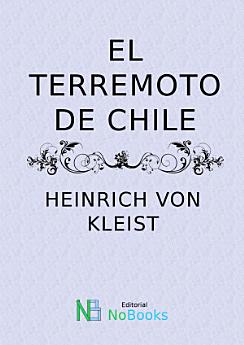El Terremoto en Chile
Heinrich von Kleist
ਜਨ 2004 · NoBooks Editorial
ਈ-ਕਿਤਾਬ
28
ਪੰਨੇ
family_home
ਯੋਗ
info
reportਰੇਟਿੰਗਾਂ ਅਤੇ ਸਮੀਖਿਆਵਾਂ ਦੀ ਪੁਸ਼ਟੀ ਨਹੀਂ ਕੀਤੀ ਗਈ ਹੈ ਹੋਰ ਜਾਣੋ
ਇਸ ਈ-ਕਿਤਾਬ ਬਾਰੇ
Este libro es parte de la colección e-Libro en BiblioBoard.
ਲੇਖਕ ਬਾਰੇ
The plays and stories of Heinrich von Kleist seem particularly modern, in that they show a world in which the individual can no longer rely on the institutions of society, the discoveries of science, or the revelations of religion. Instead, his characters can trust only in their intuition of some higher, though unknowable, providential purpose. At a time when the writers of German classicism counseled moderation and restraint, Kleist excelled in depicting elemental passions. He differed, however, from the writers of both Storm and Stress and romanticism in the austere character of his language and the almost clinical detachment of his narrative prose. Kleist was born into a distinguished though impoverished Prussian family. In 1799, he broke with family tradition by refusing to pursue a military career. For a while he wished to study natural science, but, in 1801, a reading of Kant precipitated a crisis by convincing him that knowledge was impossible. The rest of his tempestuous life was marked by generally unsuccessful attempts to establish himself in various vocations, including journalism and politics. He achieved some moderate success with his play Katchen von Heilbronn in 1810, but most of his work remained unappreciated. Prince Friedrich von Homburg, now his most celebrated play, was not to be discovered and published until 1821, a decade after the author's death by suicide. The suicide of Kleist brought him the attention that had been denied him in life. He was, almost immediately afterward, recognized as a significant writer, and his reputation has grown steadily ever since. David Luke and Nigel Reeves have written, "It is precisely Kleist's vulnerability and disequilibrium, his desperate challenge to established values and beliefs, that carry him further than Goethe and Schiller across the gap between the eighteenth century and our own age." Despite the great attention now given to the work of Kleist in Germany, he remains largely unknown to the American public. In Japan and Korea, however, in part because of cultural affinities, he is extremely popular.
ਇਸ ਈ-ਕਿਤਾਬ ਨੂੰ ਰੇਟ ਕਰੋ
ਆਪਣੇ ਵਿਚਾਰ ਦੱਸੋ
ਪੜ੍ਹਨ ਸੰਬੰਧੀ ਜਾਣਕਾਰੀ
ਸਮਾਰਟਫ਼ੋਨ ਅਤੇ ਟੈਬਲੈੱਟ
Google Play Books ਐਪ ਨੂੰ Android ਅਤੇ iPad/iPhone ਲਈ ਸਥਾਪਤ ਕਰੋ। ਇਹ ਤੁਹਾਡੇ ਖਾਤੇ ਨਾਲ ਸਵੈਚਲਿਤ ਤੌਰ 'ਤੇ ਸਿੰਕ ਕਰਦੀ ਹੈ ਅਤੇ ਤੁਹਾਨੂੰ ਕਿਤੋਂ ਵੀ ਆਨਲਾਈਨ ਜਾਂ ਆਫ਼ਲਾਈਨ ਪੜ੍ਹਨ ਦਿੰਦੀ ਹੈ।
ਲੈਪਟਾਪ ਅਤੇ ਕੰਪਿਊਟਰ
ਤੁਸੀਂ ਆਪਣੇ ਕੰਪਿਊਟਰ ਦਾ ਵੈੱਬ ਬ੍ਰਾਊਜ਼ਰ ਵਰਤਦੇ ਹੋਏ Google Play 'ਤੇ ਖਰੀਦੀਆਂ ਗਈਆਂ ਆਡੀਓ-ਕਿਤਾਬਾਂ ਸੁਣ ਸਕਦੇ ਹੋ।
eReaders ਅਤੇ ਹੋਰ ਡੀਵਾਈਸਾਂ
e-ink ਡੀਵਾਈਸਾਂ 'ਤੇ ਪੜ੍ਹਨ ਲਈ ਜਿਵੇਂ Kobo eReaders, ਤੁਹਾਨੂੰ ਫ਼ਾਈਲ ਡਾਊਨਲੋਡ ਕਰਨ ਅਤੇ ਇਸਨੂੰ ਆਪਣੇ ਡੀਵਾਈਸ 'ਤੇ ਟ੍ਰਾਂਸਫਰ ਕਰਨ ਦੀ ਲੋੜ ਹੋਵੇਗੀ। ਸਮਰਥਿਤ eReaders 'ਤੇ ਫ਼ਾਈਲਾਂ ਟ੍ਰਾਂਸਫਰ ਕਰਨ ਲਈ ਵੇਰਵੇ ਸਹਿਤ ਮਦਦ ਕੇਂਦਰ ਹਿਦਾਇਤਾਂ ਦੀ ਪਾਲਣਾ ਕਰੋ।






